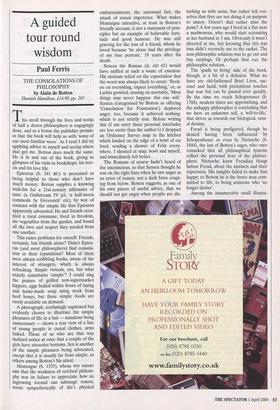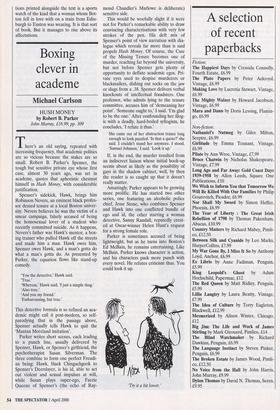A guided tour round wisdom
Paul Ferris
THE CONSOLATIONS OF PHILOSOPHY by Alain de Botton Hamish Hamilton, £14.99, pp. 265 This stroll through the lives and works of half a dozen philosophers is engagingly done, and as a bonus the publisher promis- es that the book will help us with 'some of our most familiar woes'. As I read I did try applying advice to myself and seeing where that got me. Botton does much the same. He is in and out of the book, giving us glimpses of his visits to bookshops, his trav- els and his love life.
Epicurus (b. 341 BC) is presented as being helpful to those who don't have much money. Botton supplies a knowing wish-list for a 21st-century zillionaire of taste (a Gulfstream IV jet, 'a half-moon commode by Grevenich' etc), by way of contrast with the simple life that Epicurus apparently advocated. He and friends occu- pied a rural commune, lived in freedom, ate vegetables from the garden, and found all the love and respect they needed from one another.
This raises problems for oneself. Friends, certainly, but friends alone? Didn't Epicu- rus (and most philosophers) find consola- tion in their reputations? Most of them were always scribbling books, aware of the interest of strangers, which is always refreshing. Simple victuals, yes, but what exactly constitutes 'simple'? I could sing the praises of grilled non-supermarket kippers, eggs boiled within hours of laying and home-made soup using stock from beef bones, but these simple foods are rarely available on demand.
A photograph, confusingly captioned but evidently chosen to illustrate the simple pleasures of life in a hut-- mansions being unnecessary — shows a rear view of a line of young people in casual clothes, arms linked. Those of us who are that way inclined notice at once that a couple of the girls have attractive bottoms. Sex is another of the simple pleasures being advocated, except that it is usually far from simple, as others among Botton's Six attest. Montaigne (b. 1533), whose wry nature saw that the weakness of cerebral philoso- phy was its failure to appreciate how an Ingrowing toenail can sabotage reason, wrote sympathetically of life's physical embarrassments, the untoward fart, the attack of sexual impotence. What makes Montaigne attractive, at least in Botton's friendly account, is not a statement of prin- ciples but an example of believable forti- tude and good humour. He was still grieving for the loss of a friend, whom he loved because 'he alone had the privilege of my true portrait,' 18 years after his death.
Seneca the Roman (d. AD 65) would have sniffed at such a waste of emotion. His stoicism relied on the expectation that the worst was always likely to occur: 'Reck- on on everything, expect everything,' or, as Larkin growled, musing on mortality, 'Most things may never happen: this one will.' Seneca (categorised by Botton as offering `Consolation for Frustration') deplored anger, too, because it achieved nothing: which is not strictly true. Before writing this (I am sorry these personal interludes are less exotic than the author's) I dropped an Ordnance Survey map in the kitchen which landed on the edge of a bowl of cat food, sending a shower of Felix every- where. I shouted at map, bowl and myself, and immediately felt better.
The Romans of course hadn't heard of the unconscious, so that Seneca thought he was on the right lines when he saw anger as an error of reason, not a dark force erupt- ing from below. Botton suggests, as one of his own pieces of useful advice, that we should not get angry when people are dis- turbing us with noise, but rather tell our- selves that they are not doing it on purpose to annoy. Doesn't that rather miss the point? A few years ago I lived in a flat near a madwoman, who would start screaming at her husband at 3 am. Obviously it wasn't directed at me, but knowing that this was true didn't reconcile me to the racket. The non-philosophic solution was to go out and buy earplugs. Or perhaps that was the philosophic solution.
The 'guide to living' side of the book, though, is a bit of a delusion. What we have are old-fashioned Brief Lives, suc- cinct and lucid, with pretentious touches that mar but can be passed over quickly. By the time we reach Schopenauer (b. 1788), modern times are approaching, and the unhappy philosopher is concluding that we have an unknown self, a 'will-to-life,' that drives us towards our biological, sexu- al destiny.
Freud is being prefigured, though he denied having been influenced by Schopenhauer or even by Nietszche (b. 1844), the last of Botton's sages, who once remarked that all philosophical systems reflect the personal lives of the philoso- phers. Nietszche knew Freudian things before Freud, about the instincts and their repression. His insights failed to make him happy; to Botton he is the brave man com- mitted to life, to being someone who 'no longer denies'.
Among the innumerable small illustra- tions printed alongside the text is a sports watch of the kind that a woman whom Bot- ton fell in love with on a train from Edin- burgh to Euston was wearing. It is that sort of book. But it manages to rise above its affectations.























































































 Previous page
Previous page